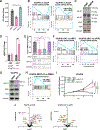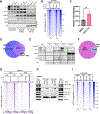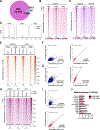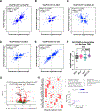Increased nuclear factor I-mediated chromatin access drives transition to androgen receptor splice variant dependence in prostate cancer
- PMID: 39709604
- PMCID: PMC11921039
- DOI: 10.1016/j.celrep.2024.115089
Increased nuclear factor I-mediated chromatin access drives transition to androgen receptor splice variant dependence in prostate cancer
Abstract
Androgen receptor (AR) splice variants, of which ARv7 is the most common, are increased in castration-resistant prostate cancer, but the extent to which they drive AR activity is unclear. We generated a subline of VCaP cells (VCaP16) that is resistant to the AR inhibitor enzalutamide (ENZ). AR activity in VCaP16 is driven by ARv7, independently of full-length AR (ARfl), and its cistrome and transcriptome mirror those of ARfl in VCaP cells. ARv7 expression increases rapidly in response to ENZ, but there is a delay in gaining chromatin binding and transcriptional activity, which is associated with increased chromatin accessibility. AR and nuclear factor I (NFI) motifs are most enriched at more accessible sites, and NFIB/X knockdown greatly diminishes ARv7 function. These findings indicate that ARv7 can drive the AR program but that its activity is dependent on adaptations that increase chromatin accessibility to enhance its intrinsically weak chromatin binding.
Keywords: CP: Cancer; CP: Molecular biology; FOXA1; androgen receptor; chromatin; epigenetics; nuclear factor I; prostate cancer; transcription.
Copyright © 2024 The Author(s). Published by Elsevier Inc. All rights reserved.
Conflict of interest statement
Declaration of interests P.S.N. has received consulting fees from Janssen, Merck, and Bristol Myers Squibb, and research support from Janssen for work unrelated to the present studies.
Figures







Update of
-
Increased chromatin accessibility mediated by nuclear factor I drives transition to androgen receptor splice variant dependence in castration-resistant prostate cancer.bioRxiv [Preprint]. 2024 Jun 24:2024.01.10.575110. doi: 10.1101/2024.01.10.575110. bioRxiv. 2024. Update in: Cell Rep. 2025 Jan 28;44(1):115089. doi: 10.1016/j.celrep.2024.115089. PMID: 38260576 Free PMC article. Updated. Preprint.
References
-
- Stanbrough M, Bubley GJ, Ross K, Golub TR, Rubin MA, Penning TM, Febbo PG, and Balk SP (2006). Increased expression of genes converting adrenal androgens to testosterone in androgen-independent prostate cancer. Cancer Res. 66, 2815–2825. - PubMed
-
- Smith MR, Saad F, Chowdhury S, Oudard S, Hadaschik BA, Graff JN, Olmos D, Mainwaring PN, Lee JY, Uemura H, et al. (2018). Apalutamide Treatment and Metastasis-free Survival in Prostate Cancer. N. Engl. J. Med. 378, 1408–1418. - PubMed
Publication types
MeSH terms
Substances
Associated data
- Actions
- Actions
- Actions
- Actions
- Actions
Grants and funding
LinkOut - more resources
Full Text Sources
Medical
Research Materials
Miscellaneous

